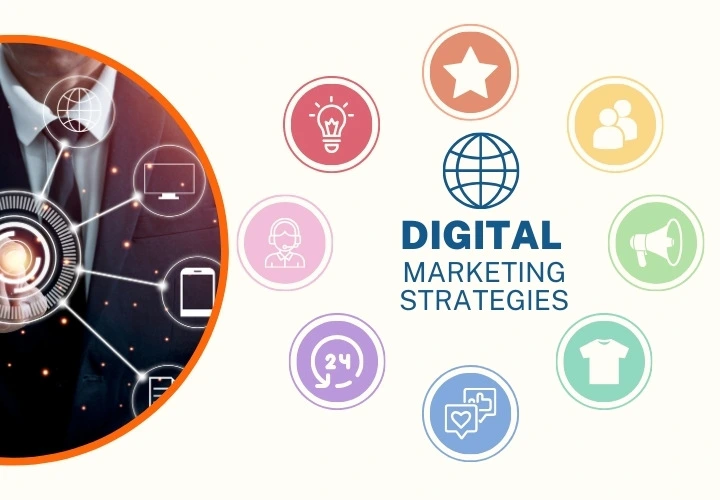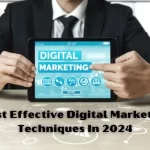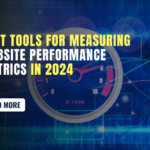Top 50 Digital Marketing Strategies For Your Small Business in 2024
Recently updated: November 21st, 2025
Every business needs top marketing strategies to boost its sales, revenue, and brand awareness in this evolving digital marketing world. Navigating the wide spectrum of online platforms, technologies, and customer behaviors requires approaching the target audience to fulfill their needs.
The annual growth rate of digital marketing from 2020 to 2026 is projected at 9%.
Small businesses may face many challenges due to less visibility and a lack of resources like budget, time, and the right channel. Understanding and applying different digital marketing strategies is essential for small businesses to stand out differently from everyone else in the digital market.
In this comprehensive blog, you will learn about 50 digital marketing strategies for small businesses in 2024. From content marketing to opting for the right technologies, this blog will help small businesses elevate their digital marketing.
In this blog, we will discuss:
- 20 Small Business Marketing Strategies
- 20 Digital Marketing Tips For Small Businesses
- 10 Ideas for Advertising For Small Businesses
20 Small Business Marketing Strategies
1. Know your audience
Define and understand your target audience’s demographics, preferences, and behaviors to make changes in your marketing efforts effectively. To appeal to buyers within it, you must understand their key points, their problems, main events, and priorities.
What can drive them to make a purchase? What do they want from your business? And how can they be successful in making a purchase? Knowing these things will help you craft content about your business that connects with your target audience.
2. Create a strong brand identity
The second and foremost important digital marketing need for small businesses is developing a unique brand voice, eye-catching visuals, and innovative messaging that can connect with your audience and set you apart from competitors.
3. Define a clear objective and set a goal
Whenever you start a digital campaign for your business, you have to set an objective that you need to achieve. It is an important step to define your goals and objectives; only then can you implement further digital strategies in your business.
Set an ultimate goal around that one main area you want to focus on and use your resources on the activities that will help you achieve your goals. You can further expand your online marketing efforts when you fulfill one particular goal for your business.
4. Opt for search engine optimization (SEO)
Through search engine optimization, you can easily get the desired results for your business, and that will also enhance your online presence.
Optimize your website content and meta tags with relevant keywords, improve the page loading speed, enhance the user experience, eliminate duplicate content, and fix technical issues on your website to make your website SEO-friendly. It will help attract more organic traffic, qualified leads, and more sales.
5. Double-down on online strategies that work best for your small business
Once you have identified the right strategies that are working more effectively for your business, you should increase their usage and implementation to enhance your business. If you double its usage, then its outcome is also increased.
As you grow, it is great to focus more on the proven strategies for generating high revenue and conversions.
6. Build strong relationships with your existing customers
When you acquire new customers, it will take lots of hard work, the right strategies, and the correct way of marketing. This means you should not stop marketing to your previous customers once they have made a purchase.
Rather, identify opportunities for repeat purchasing, cross-selling, and building strong relationships with them because your existing customers already know about your brand. If you provide a good experience to your customers, you have given them a reason to do business with you again.
7. Use free resources or tools
It is important to understand that you have limited goals for your business, so you can use free tools available in the market. Use free samples, trials, or resources that showcase your expertise and encourage conversions.
You can also opt for paid tools only when you know they can greatly improve performance. Some marketing tools are HubSpot CRM, AdStage, Google Keyword Planner, and so on.
8. Build a responsive website
A website is one of the most important elements that you will create for your small business. This is the desirable place where you will showcase your offerings, quality content, and how a customer can contact you.
This is the website that you will always own, and it has the capability of generating organic traffic. Ensure your website is mobile-friendly, loads quickly, and provides a seamless user experience to capture and retain visitors.
9. Write blogs to attract potential customers to your website.
Writing blogs is a great way to generate organic traffic, especially for customers who have not made the purchasing decision yet. Blogging can establish credibility and authenticity for your business.
You can start writing a blog by using a free website tool along with its free templates. This will improve your online visibility and educate your potential customers. You can add a call-to-action to your posts as well to gain more customers.
10. Social media marketing
Today, most business owners use social media platforms for certain reasons, as social media is a powerful business tool. You should utilize different social media platforms where your audiences are mostly present.
Over 91% of businesses use social media for marketing.
Engage, share content, run targeted ads, and build relationships on platforms like Facebook, Instagram, LinkedIn, or Twitter. Social media marketing can help you engage with potential customers, build brand awareness, and promote your products online.
11. Partnerships and collaborations
Team up with complementary businesses or influencers to expand your reach and tap into new audiences. Instagram, YouTube, and Facebook are top social media platforms where you can choose influencers and collaborate with them.
Collaborating with influencers is a great way to get your business in front of the eyes of your audience.
Also Read: Why Do Small Businesses Fail At Digital Marketing?
12. Video Marketing
Small businesses should also include videos rather than only written content. Video can be short or long as needed; short videos are more impactful and effective on audiences. You can use video generator to make it more professional.
Create engaging and informative videos to share your brand story, products, or customer testimonials. You can add these videos to YouTube, Instagram, TikTok, and Facebook to connect with your audiences effectively.
40% of businesses plan to incorporate TikTok into their social media strategy.
13. Paid advertising
Paid advertising can target audiences with high intent, which is a great option for small businesses. Invest in targeted online advertising, such as Google Ads, social media ads, or display ads, to reach a broader audience.
Digital ad spending worldwide was estimated at $441 billion in 2022.
Also Read: How Can Advertising Be Effective Through Digital Marketing?
14. Email marketing
Email marketing is an important marketing strategy and the most effective method of marketing. Email marketing is used by 31% of marketers. This strategy is an easy and free way to communicate with both new and existing customers.
Develop an email list and send targeted, valuable content, promotions, and updates to improve customer relationships.
15. Customer relationship management
Use CRM software to manage customer interactions, track leads, and personalize communication for better engagement. Your CRM has information about your leads and customers, so you can keep track of customer interactions and identify sales opportunities.
16. Community engagement
Engage with your audience by participating in forums, groups, or hosting events, building a sense of community around your brand.
17. Mobile Marketing
Mobile marketing is a component of digital marketing that focuses specifically on reaching and engaging with users on mobile devices, such as smartphones and tablets.
Develop strategies that fulfill the needs of mobile users, including mobile-optimized content, apps, or SMS marketing.
18. Local SEO and Listings
Local SEO (search engine optimization) and local listings are strategies employed to enhance the visibility of businesses in local search results. These techniques are crucial for businesses that operate in specific geographic locations and want to attract local customers.
Optimize your online presence for local searches by listing your business on Google My Business and other relevant directories.
Connect with other local business owners in your area to expand your business with them. This will create discounts, deals, or coupons for customers.
19. Customer feedback and improvement
Actively consider customer feedback to make changes to your products or services and enhance customer satisfaction.
56% of customers say a company’s response to a review changed their perspective on the business
20. Analytics and data analysis
Analytical tools play a crucial role in digital marketing by providing insights into the performance of various marketing channels, campaigns, and overall online presence. Some widely used analytical tools for digital marketing are Google Search Console, HubSpot, SEMrush, and so on.
Use analytics tools to track the performance of your marketing efforts and adjust strategies accordingly to become successful.
Regularly track and analyze your marketing efforts to identify what’s working and what’s not, and adjust strategies accordingly.
Also Read: How Digital Marketing Helps Small And Medium Businesses?
20 Digital Marketing Tips For Small Businesses
1. Create a brand image
The very first step in digital marketing is to create a positive brand image in the market. Emphasizing more on building the brand identity and identifying an overview of your position in the digital market to make the brand image more positive.
Be consistent with your offerings, and use effective messaging across all digital platforms to build recognition and trust.
Also Read: Top 10 Digital Marketing Strategies Followed by Top Brands in 2024
2. Know your audience completely
Understand your target audience’s preferences, behaviors, and main points for implementing strategies effectively and successfully.
It is a very important part of understanding your target audience in digital marketing. It highlights the role of analytics tools, like Google Analytics, in gathering insights on user behavior.
3. Optimize your website
Optimizing a website focuses on enhancing website performance for a better user experience and search engine visibility.
It involves improving loading speed, mobile responsiveness, and SEO elements. Optimization enhances site usability, attracts more visitors, and ultimately boosts online presence and conversions.
Ensure your website has all the important elements to provide a seamless experience for visitors.
4. Design important elements of your business
Design your business website, logo, and theme with proper color patterns and with amazing designs. You can use any free software to design your website’s elements. It will help grow your business and attract more customers.
5. Use CMS to build your business website
A content management system makes the process of creating a website simple and easy. Most CMSs offer free customizable templates. It will make your website more authentic.
Once you have created your website, most CMS platforms offer plugins to help you optimize your content for search. This will improve your website’s visibility in different search engines.
6. Use social media platforms
Establish a presence on relevant social media platforms and engage with your audience through regular posts, interactions, and community engagement. Consider which content will connect with your target audience and how you will convert them into potential customers.
7. Monitor and respond to reviews
Regularly monitor and respond to reviews on platforms like Google, Bing, or social media to manage your online reputation and grow rapidly through different social media platforms.
8. Monitor analytics through free analytics tools
Monitoring your analysis through analytical tools empowers digital marketers with the information needed to assess the success of their campaigns, identify areas for improvement, and make data-driven decisions to optimize their overall digital marketing strategy.
Utilize tools like Google Analytics, Instagram Insights, and so on to track website traffic, user behavior, and campaign performance, allowing you to make data-driven decisions.
9. Opt for SEO
SEO is a vital component of digital marketing that aims to improve a website’s visibility in search engine results. It involves optimizing on-page elements, content, and technical aspects to align with search engine algorithm updates.
Effective SEO techniques boost organic search traffic, increase site credibility, and contribute to better online visibility and rankings.
Implement on-page and off-page SEO strategies, including keyword optimization, meta tags, and link building, to improve search engine rankings.
10. Research keywords
Keyword research is an important part of creating content for your target audience. Find out the best keywords for your brand through different tools.
Use these keywords in the right place, like in the meta description, page titles, and H1 tags, to rank highly on search engines.
11. Use Different Variations of Content
Produce high-quality, valuable content that fulfills your target audience’s needs and interests across various formats like blogs, videos, infographics, and podcasts.
12. Mobile Search Optimization
Optimizing your website and content for mobile search engines. With the increasing use of mobile devices for internet searches, having a mobile-friendly website is crucial for search engine rankings.
Ensure your digital marketing techniques, including mobile-responsive design and mobile-friendly content, are optimized for mobile users.
It is important to have a website that is quick and responsive because most of the searches are done on mobile phones.
13. Implement chatbots
Small businesses can use chatbots and AI in digital marketing to enhance customer engagement, automate processes, and streamline operations. Like 24/7 customer support, email marketing automation, lead generation, FAQs, and so on.
Through AI-powered chatbots on your website or social media, you can provide instant customer support and assistance.
14. Use short videos in marketing
Video marketing in digital strategies involves creating and sharing compelling video content to engage, inform, and attract a target audience. It enhances brand visibility, communicates messages effectively, and fosters customer connection.
Incorporate video content into your strategy, as it tends to have higher engagement rates, whether through tutorials, product demos, or behind-the-scenes footage.
15. Build attractive landing pages
A landing page is an essential element for potential customers to gain information by filling out a short contact information form. Landing pages increase the chances of customer conversion.
16. Email marketing campaigns
Email marketing is a key component of digital marketing, involving the use of emails to communicate with a target audience. It encompasses sending promotional content, newsletters, updates, and personalized messages to subscribers.
Build and maintain an email by offering valuable content and exclusive offers to engage and convert leads into potential buyers.
17. Educate and inform your audience
Showcase or build your position as a business expert by sharing informative and educational content, such as whitepapers, webinars, or case studies.
18. Prioritize customer service
Prioritizing customer service in digital marketing not only enhances customer satisfaction but also contributes to brand loyalty, positive word-of-mouth, and repeat business. By creating a positive and supportive online environment, businesses can differentiate themselves in the competitive digital world.
Provide excellent customer service across all digital channels to strengthen customer loyalty and positive offerings.
19. Experiment and adapt
Continuously test different strategies, analyze results, and adapt your approach based on what works best for your business.
20. Stay updated with the latest trends
Keep up with the latest trends and changes in the digital marketing world to adapt your strategies for maximum effectiveness.
10 Ideas for Advertising For Small Businesses
Here are ten advertising ideas for small businesses:
1. Social media advertising
Utilize platforms like Facebook, Instagram, LinkedIn, or Twitter to create targeted ads that reach specific demographics based on interests, behaviors, and location.
2. Google ads
Invest in Google’s pay-per-click advertising to appear at the top of search engine results for relevant keywords related to your business.
3. Local publications
Advertise in local newspapers, magazines, or directories for target audiences to get immediate responses.
4. Event Sponsorship
Sponsor local events, workshops, or community gatherings to increase brand visibility and show support for your community.
5. Vehicle branding
Utilize vehicle wraps on company vehicles to advertise your business. It is especially effective for service-based businesses.
6. Email marketing campaigns
Send targeted and engaging emails to your subscriber list, promoting products, sharing updates, or offering exclusive deals.
7. Write blogs
Create valuable and informative blog content that addresses your audience’s main points, building trust and authority in your industry.
8. Referral programs
Encourage existing customers to refer friends or family by offering discounts or incentives for successful referrals.
9. Google My Business
Optimize your online presence for local searches by updating and optimizing your Google My Business listing, ensuring accurate and consistent information.
10. Collaborate with micro-influencers
Collaborate with influencers or individuals with a significant message about your business to promote your products or services to their audience.
Also Read: Mastering the Art of PPC in Digital Marketing
Conclusion
In this digital world, utilizing these digital marketing strategies for small businesses is effective. From data-driven insights to immersive experiences, this comprehensive guide underscores the necessity of adapting to emerging trends.
Successful digital marketing lies in a strategic mixture of innovation, analytics, and customer-centric approaches for sustained growth and relevance in the market.
These opportunities are paramount for small businesses that want to improve their online presence.
Latest posts by Vijaya Tyagi (see all)
Important Tips & Tactics to Boost Your Website Reputation!! - October 16, 2025
14 Years, Thousands of Campaigns, Countless Stories – And We’re Just Getting Started - September 29, 2025











